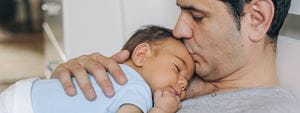
Not all new fathers are puzzled by their role but enough are to warrant a few comments. It is a humbling experience to assume this responsibility and it does not come naturally. New dads should know that the quandary of the initial phase is temporary.
Being a father is a life changing event. Before child (BC) there was the couple and they had just each other. They were best friends, lovers and dreamers, a couple with only their individual obligations to each other. They took on each other’s interests and began build a future. Two jobs and careers on the fast track they renovated a house, traveled, dined out, worked out and maybe brought home a dog. For the couple, it was pretty sweet and the best part was they may have even had some cash. When she became pregnant, it seemed like a natural progression in their new life together. It was such a big event that ultrasound exams became more momentous than the playoffs.
Then suddenly the birth changed everything; it was a lifestyle earthquake about eight on the Richter scale. The first tremor came when she told him that her labor agony “was his fault” and sent him from the birthing suite. In the weeks that followed, no matter how many child care books he had read, it was a time of personal uncertainly. This new infant just slept and when awake, it seemed to be permanently attached to his wife’s breast, or it cried. To this new dad that appeared to be the extent of its existence. The cry was painful; it was piercing and loud and seemed to cause his wife tension and self-doubt. The cry was worse at night and timed to inflict maximum damage on his sleep. The infant with the lumpy head then developed a scalp rash and facial acne. The poop was nasty greenish mustard and happened many times a day. A red rash later developed around its rectum which became his fault for sleeping through a diaper change. Occasionally the baby would spit up and its poor eyes still had this jaundice some three weeks after birth, “that can’t be good” he may think.
Because of sleep deprivation and massive hormonal fluxes, his previously confident woman now had painful breasts and became suddenly hostile or despondent or both within the same hour. Any suggestions he had for the infants care were dismissed, sometimes with a look of incredulity. The worst part was the relinquishing of marital intimacy. For the new father it was confusing time and a loss of confidence, even the dog seemed to leave the room when he came in. Thankfully this phase does pass and the self-confidence of most fathers grows on a slow but impressive scale. It happens when this frail infant begins to gain weight, rolls over and starts to interact socially at about eight- weeks, and it’s not just gas. The baby reacts with a smile and then laughs at the lamest faces and sounds, and by 10 months its first words may well be “dada.”
Tummy time becomes an opportunity for time together and fathers may even offer to change a diaper. By age three, the very best part of this little girl’s day may be the moment her father walks into the room. When fathers stay involved in care and without any noticeable achievement they become a hero in the eyes of their child. Later in life some of fathers most lasting memories will be those hours spent reading her books at bedtime and not that NFL division playoff game. Life Insurance and 529 plans will take on new importance and the hardest part of working that extra shift is that it means time away from the child. Fathers will often take that extra shift because doing so may in some small way improve her future. Even the spouse may suddenly find a Dad sexy again and is waiting for the baby to fall asleep for other reasons than sleep. When this child is nine and dads teach her the difference between a “curve ball” and a “change-up” he will, in her eyes, walk on water. So the message to all new fathers is that things do get much better. The initial months may seem not much about the poppa but actually in those days and in the long run the value of a father becomes priceless.
Michael Jordan, MD, MS-HQSM, CPE, FAAP, Chief of Pediatrics at Newark-Wayne Community Hospital is board-certified in Pediatric Medicine. He attended the College of Human Medicine at Michigan State University and completed his residency training at the University of Rochester. In addition to his leadership role as chief of Pediatrics at Newark-Wayne, he is the medical director of Rochester Regional Medical Group and is also chair of Rochester General Medical Group’s Quality Committee. He works in the Sodus Rochester General Medical Group Pediatric office.